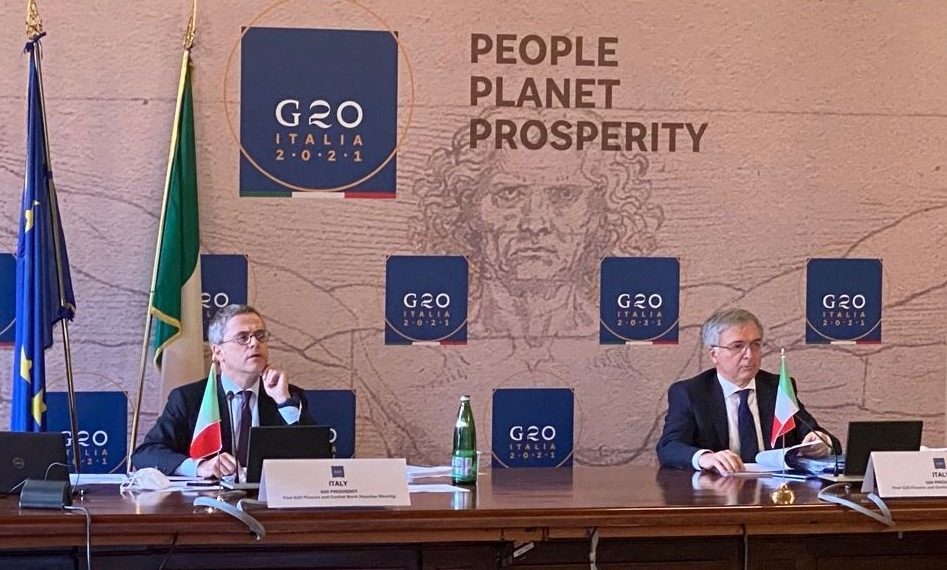Digital and green economic recovery topped the agenda at first G20 Finance and Central Bank Deputies meeting
The meeting was also the occasion to present programs and priorities of the various G20 financial working groups.
January 25th, 2021
Today, Monday 25 January, high-ranking officials from the G20 Finance track membership, together with representatives from guest countries and international and regional organisations, gathered virtually for a two-day Finance and Central Bank Deputies meeting to discuss and approve the work plan for the rest of the year.
Given the Covid-19 pandemic’s ripple effects on global economic activities, the recovery will be at the centre of the G20 agenda.
During the last Summit in November 2020, global Leaders agreed to act fast and collectively to put the global economy back on the pathway to growth. The start of the New Year was filled with hopes for a rapid return to normal life. Yet, looking at economic trends, many wonder whether ‘normal’ will be enough to drive the world out of the crisis and towards more sustainable and inclusive societies. In fact, the pandemic has exposed the profound vulnerabilities that were already challenging the global economy even before the Covid-19 outbreak.
During the crisis, in 2020, as economic activity was severely affected by containment measures, the extensive use of new technologies proved successful in reducing the number of short-run disruptions of supply chains on specific consumption streams. The crisis has showed how digital transformation can be a driving factor for sustaining economic recovery and promoting productivity growth in the post-Covid-19 crisis.
Now this debate is at the core of the Italian G20 Presidency Finance Track agenda. Today’s G20 Deputies meeting started with a discussion on digital transformation, inspired by a keynote speech from Erik Brynjolfsson, Jerry Yang and Akiko Yamazaki Professor at Stanford and Director of the Stanford Digital Economy Lab.
The Italian G20 Presidency priorities are centred on three main pillars: People, Planet and Prosperity. The Ps also represent the drivers for building a strong, sustainable, balanced and inclusive growth.
People means ensuring shared opportunities within and across countries. Policy action, therefore, should also aim to ensure that populations, sectors and countries reap the benefits of digital transformation.
Yet, sustainable and inclusive growth requires an assessment of the current environmental crisis. Planet means favouring the transition towards a greener global economy. Recovery through digitalisation has to be focused on innovative solutions designed to boost prosperity, while minimising the impact these technologies may have on the planet.
Prosperity. G20 members agreed to work together to better understand the scope of productivity divergence across G20 economies, identify the factors for boosting productivity and facilitate the design of adequate policy responses.
Increased productivity, global growth and prosperity should become instrumental in improving the quality of life of all people, through measures geared towards skills development and social inclusion. Digitalisation should become an opportunity for all, and global Leaders will have to address the social and economic challenges, which may emerge in more digitalised and innovative societies.
A further item of the Deputies Agenda were the priorities and work programmes of the G20 Finance Track Working Groups.
The Framework Working Group (the FWG had its first meeting on 12 January 2021), will focus on the policy challenges around immediate policy support for the recovery, while addressing long-standing challenges such as climate change and inequality. It will look at policy options to provide emergency support, while enhancing productivity through digital transformation. In 2021, the FWG will enhance its global risks monitoring efforts, also with the aim of being better prepared for weathering future risks.
The International Financial Architecture Working Group (the IFA WG, started its activities on 17 December 2020) will continue monitoring the Debt Service Suspension Initiative (DSSI), a temporary debt moratorium, and discussing its potential further extension to free up short-term liquidity for the most vulnerable countries. It will also monitor the Common Framework for debt treatments beyond the DSSI, which will help these countries renegotiate their debt obligations to make them sustainable, and look at initiatives to improve debt transparency for both creditor and debtor countries. The IFA WG will also assess the financing needs of low-income countries and explore innovative ways to address them. IFA WG members will also focus their attention on strengthening further financial resilience through better management of the risks stemming from excessive capital flows’ volatility, by developing domestic capital markets, and through a strong and effective Global Financial Safety Net (GFSN).
As the Covid-19 crisis is having disruptive effects on several infrastructure networks (transportation, energy, water), as well as on social infrastructures (healthcare, education), the Infrastructure Working Group (the IWG already met on 14 December 2020) will continue its work to promote quality infrastructure investments. Under the Italian G20 Presidency, the IWG will work on defining this transformative infrastructure-related response around four pillars: resilience and maintenance; digital infrastructure; sustainable infrastructure and social inclusion.
The Working Group meetings scheduled in 2021 will further discuss and examine the above-mentioned issues. Their work will feed into the four G20 Finance Ministers’ and Central Bank Governors’ meetings and, eventually, to the agenda of the Leaders’ Summit to be held on 30-31 October 2021 in Rome.
